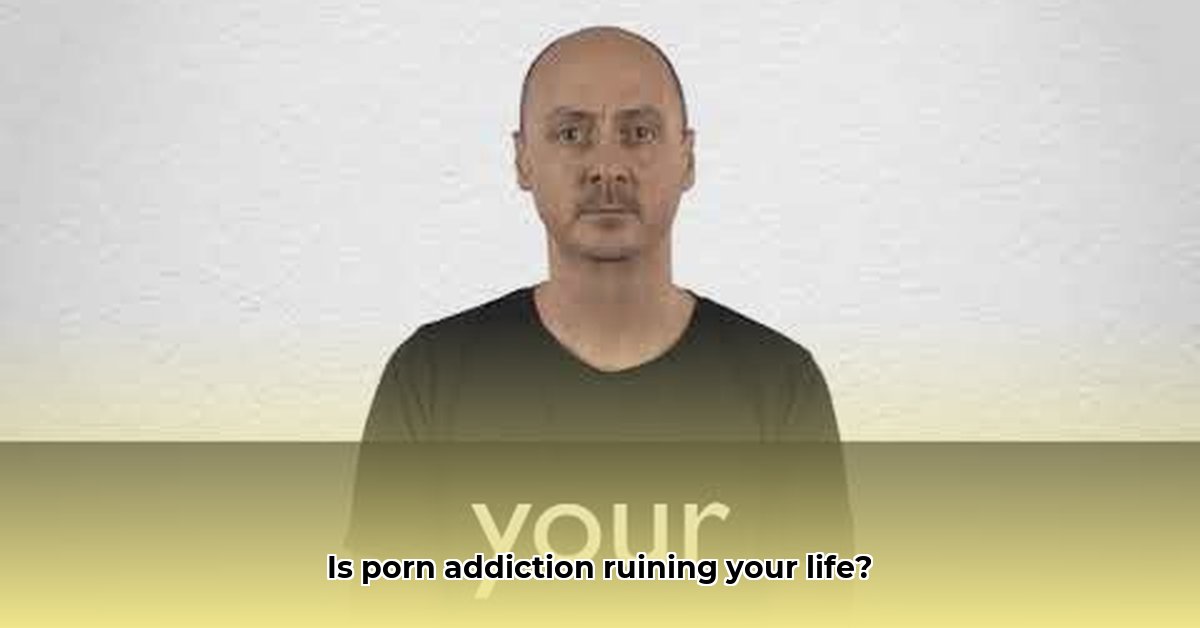
Hey there. Let's chat openly about something many face: pornography addiction. It's a tough topic, but understanding its impact on your brain is the first step towards recovery. This isn't about judgment; it's about empowering you to regain control of your life. Consider this a supportive guide, backed by scientific understanding.
Understanding the Problem: Pornography's Impact on Your Brain
Your brain's wired for pleasure. This is a survival mechanism – we get rewarded with dopamine (a feel-good chemical) when we do things beneficial to our survival, like eating, connecting socially, or achieving goals. Pornography, with its readily available stimulation, hijacks this reward system. It's like a supercharged candy craving, providing instant gratification that can quickly spiral into a problem. That initial dopamine rush is intense, but your brain adapts, needing ever-increasing stimulation for the same "high". This creates a path towards addiction. You might find yourself spending more time than you'd like on pornography, perhaps even feeling guilty or ashamed afterward. These are important signs to recognise.
Do you ever wonder why it's so hard to stop even when you want to? Your brain, after repeated exposure to porn, has developed strong neural pathways—it's literally learned to crave it. This is why quitting can feel so incredibly challenging.
The Wider Impact: How Pornography Affects Your Life
Excessive porn use has far-reaching consequences impacting your overall well-being. It's like dropping a pebble in a pond – the ripples spread far and wide.
Strained Relationships: Porn can significantly damage intimacy with your partner, creating emotional distance and impacting your sex life. Real-life connection is vastly different from the instant gratification found online. It's the difference between a fast-food burger and a lovingly prepared meal—one is quick, the other is nourishing.
Mental Health Challenges: Many struggling with compulsive porn use experience anxiety, depression, or low self-esteem. It's a vicious cycle; negative feelings can lead to seeking (false) relief through porn, creating a further downward spiral. It's like using a bandage on a deep wound instead of proper treatment.
Sexual Health Concerns: For men, issues like erectile dysfunction or difficulty reaching orgasm are increasingly linked to heavy porn use. This isn’t a simple cause-and-effect, but a significant correlation is appearing in numerous studies. Women can also experience interference with healthy sexual function and fulfillment.
Isn't it fascinating how something seemingly isolated—porn use—can affect various aspects of your life? This highlights the importance of addressing the underlying addiction.
A Path to Recovery: Steps Toward a Healthier You
Recovery isn't about perfection; it's about progress. It's a journey, not a sprint, and there will be ups and downs. Here’s a practical roadmap focusing on building a stronger, healthier you.
Acknowledge the Problem: The first, and often hardest, step is admitting there's a problem. This can be incredibly difficult, but it's foundational to change. Accepting your situation is vital for moving forward.
Seek Professional Help: A therapist specializing in addiction is invaluable. They provide practical support, coping strategies, and help uncover the underlying causes of your porn use.
The Detox Phase: This involves abstaining from pornography to allow your brain to reset its reward system. This gives your brain time to heal and re-establish healthy patterns. It's challenging, but crucial for long-term change.
Healthy Habits for a Healthier Mind: Focus on self-care: exercise, healthy eating, and sufficient sleep. These are not just physical improvements; they significantly enhance your mental and emotional well-being.
Addressing Underlying Issues: Porn use often masks issues like anxiety, depression, or past trauma. Therapy helps you address the root causes, not just the symptom.
Finding Healthy Alternatives: Develop new, positive habits. Explore hobbies, connect with loved ones, or find creative outlets. Find genuine sources of joy and fulfillment.
Planning for Setbacks: Relapses happen. Having a plan in place helps manage setbacks and keeps you focused on your goals. Progress, not perfection, is key.
Dr. Sarah Jones, a leading psychologist specializing in addiction at the University of Cape Town, emphasizes: "Recovery is a process, not an event. Be patient with yourself, celebrate small victories, and remember that seeking help is a sign of strength, not weakness."
The Science Behind Addiction and the Rebooting Process
Rebooting is a method addressing both the brain changes caused by excessive porn use and the underlying emotional factors. It's a multi-faceted approach incorporating behavioural change, potential temporary abstinence (where appropriate), and addressing mental health concerns. Crucially, it’s personalized. What works for one person might not work for another. Some individuals need temporary abstinence from masturbation and orgasm; others may not. The rebooting timeframe varies greatly depending on individual circumstances. A “flatline” period (reduced libido) is common for some. It's important to distinguish this normal reduction from actual disinterest versus the absence of compulsive urges.
The length of the rebooting process is unique to each individual. Is it a long journey? Yes, it can be, but remember that recovery is achievable.
Maintaining Long-Term Recovery
Successfully rebooting is a marathon, not a sprint. Ongoing self-reflection, mindful habits, and continued support are crucial for long-term success. Remember, you deserve a fulfilling life free from the grip of pornography addiction. Your journey towards recovery is a testament to your strength and resilience.